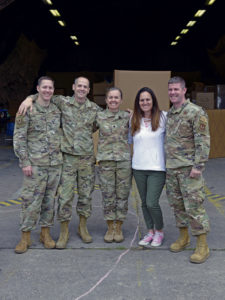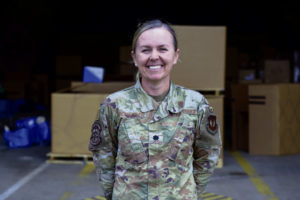
What started as a clothing and shoe drive turned into a large donation process to sustain the evacuee population from Afghanistan temporarily housed on Ramstein Air Base, during Operation Allies Welcome.
After U.S. Air Force Master Sgt. Andrew Wilder, 86th Maintenance Group first sergeant, rallied a team of three other first sergeants to lead donation efforts, the team received donations valued at $1.3 million from local and international communities during the evacuation operations.
Wilder, along with Master Sergeants Daniel Leonard, Mitchell Meis and Patrick Rodarte, first sergeants for the 86th Mission Support Group, 450th Intelligence Squadron and 86th Munitions Squadron respectively, said they saw a need to help people in need. Donations were critical to support evacuees during their temporary stay at Ramstein and at their other destinations.
“We had people who were jumping onto a plane with maybe a carry-on suitcase, or maybe nothing other than what they were wearing,” Rodarte said. “It was important to provide them with a little bit of dignity.”
The donation process began on the evening of Aug. 19, shortly after evacuees arrived at Ramstein. The team, who originally stored donations in an empty room in Wilder’s office on the flightline, quickly came together to overcome obstacles such as a need for volunteers and additional storage space.
“It dawned on us really quickly that we needed more space,” Meis said. “We started looking for options around the base until we ended up at the Nightingale Theater.”
The 86th MUNS provided the team with intermodal shipping containers to store items. There was no shortage of volunteer support from the local community either. The endeavor was made possible due to more than 2,500 people from the Kaiserslautern Military Community to collect and distribute donated items to evacuees.
Some of the first sergeants’ daily responsibilities during OAW included conducting a meeting to discuss the day’s plan, coordinating with volunteers and ensuring items were being distributed safely. They also identified how many clothing kits were created, which pod they would go to and who would be in charge of distribution.

“From seeing someone deliver [donations] and then to actually hand it to people, it was awesome to be able to be there at every part of the process,” said Wilder.
Many of the donated items were not only from the Kaiserslautern Military Community, but they were from the United States, Belgium, France and other countries around the world. The overwhelming amount of support and coordination by the first sergeants provided quality of life items for all evacuees within two weeks. They continued to accept formula, diapers and other necessary items.
“It’s been amazing to see,” Rodarte said. “Hundreds of volunteers from across the community recognized how important it was to help with this process. Watching it grow into what it did was amazing.”
Volunteers collected more than 110 tons of donations, said Meis. Due to the number of donated items, many had to be redirected from Ramstein to other bases in an effort to support those who also accepted evacuees.
While the efforts carried out by large teams over long hours could be exhausting, comradery and newly formed relationships kept morale high throughout the operation.
“Before this started, we knew each other in passing as other first sergeants,” said Rodarte. “Throughout working 15-hour-days together seven days a week, we became incredibly close. They’re some of my best friends and we act like brothers. It’s been long hours and hard work, but I’m glad it drew me close to these guys.”
Lt. Col. Meghan Vanderheiden, 86th Dental Squadron Support Flight commander, became involved in the clothing distribution effort early on and has seen the first sergeants’ strengths in managing donations and working together.
“I think that this operation really highlights one of our strengths as a military,” Vanderheiden said. “We are able to rapidly respond to any situation that we are given and we are able to reach out to our local network for global support.”


